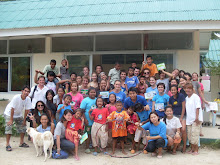
http://www.surinfarmersupport.org/
On June 29, 2009, Dr. Silverman and some UCLA students visited an organic farm in Chumphon. We noticed that there was no monoculture, a style in which one crop occupies vast fields as seasons change. Pests can foster, so unnatural pesticides are used. Synthetic fertilizers are common, which depletes soil nutrients and undermines the aim of achieving high yields. However, this particular plantation used natural fertilizer coming from the manure of water buffalos rummaging around on the fields. During our walking tour, we noticed polyculture – a style in which multiple crops are simultaneously planted around the same field. Thanks to crop rotation, a species grows off of the nutrients left in the soil by the species that previously occupied the area. Inter-cropping is also beneficial since it maximizes the use of space. Different plants are embedded between rows of a primary crop. Diverse plants can help each other grow. Furthermore, we noticed papayas, coconuts, watermelons, and finger-nailed bananas, cucumbers and green bean strings that were growing. We only planted one type of rice, but there were other grain varieties around – some that even produced milk. In any case, getting hands-on agricultural experience -- which involved bending over, getting soiled and exposing myself to the capricious weather – gave me a deep appreciation for farmers whose contributions to the economic sphere were overlooked. Fortunately, this farm was recognized, as evidenced by the Thailand king who gave it an award for self-sufficiency. -Amy Ta


FYI on Chumphon Cabana and diving
ReplyDelete[http://www.finsonline.com/tv/chumphon-cabana-interview/]
I did not go on the sustainable farming excursion, so I find this information particularly interesting. Upon reading this, I notice that crop rotation is emphasized there so as to maintain the soil’s nutrients. This immediately struck me as especially important because of my research for my final project at the Beluga School for Life. At the Beluga School, the vast majority of their land is not capable of growing most plants at this point, which hinders their sustainability practices since they are then forced to look to local markets to get much of their food. The reason that this land is not good for growing is because before the Beluga School bought the land, it was all agricultural, and the farmers in charge of the land did not practice crop rotation to ensure the lasting quality of the soil. So now, the Beluga School for Life is left with a huge wealth of land that is fairly useless, proving that without the sustainable practice of crop rotation, the sustainability of not only the farm is compromised, but the sustainability of any future establishment on the land is automatically compromised as well.
ReplyDeleteFor students interested in sustainable vocations see this site:
ReplyDeletehttp://www.sustainablevocations.org/blog
The program in located in Santa Barbara County.